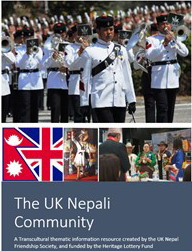
The UK Nepal Friendship Society (UKNFS) is pleased to announce that it’s two year+ UK Nepali cultural and social prejudice project, resources have now (August 2021) been launched in their online/website form, which can be accessed at the project’s main website: https://nepaliculturalheritage.com/ — ‘Nepali Cultural Heritage: UK Nepali cultural & social heritage and more.’
The best introduction to the value, utility, and impact of the resource can be found at its dedication and best wishes page (accessed from the About Page), which includes best wishes and congratulations from amongst others the Prime Minister of Nepal, Ambassador of Nepal to the UK, Nepali community organisations leads, the Head of the National League System of England FA (Wembley), and in particular the President of The Royal British Legion (TRBL), Lt General James Bashall CB CBE. Link: http://nepaliculturalheritage.com/supportive-good-wishes-dedications/
There is also a Nepali cuisine, home cookery component to the resource. This can be accessed at: https://foodsofnepal.com/: ‘Foods of Nepal: Home-Made Nepali Cuisine & More.‘
The resource has received great acclaim for its quality, scope, structure and internationally important ground-breaking educational & learning effectiveness for those with minor to passionate levels of interest in learning about Nepali cuisines through the medium of home cookery at nutritional, cultural contexts, and direct learn and practice levels. The resource also has a dedications and best wishes section (accessed from the About Page) with amongst others the Prime Minister of Nepal and Nepal’s Culture Minister: https://foodsofnepal.com/dedications-formal-notes-of-best-wishes/
The resource dissemination is currently taking place at national to county levels are receiving outstanding feedback as the resources are felt to be at last remedying long-standing, sorely felt deficits in knowledge about the Nepali community, it’s culture and history. From national museum/institutes department leads [such as Dr Mark Watson, Head of Flora at the Royal Botanical Gardens Edinburgh (RBGE)], to local authority CEOs (Swindon, Ashford, etc.), to volunteer centres (across Kent), and county level DWP (Kent) and West London DWP, the reception of the resources have set in motion many actions that presage a transformed profile of and engagement with our UK Nepali community.
The project resources have therefore far exceeded the hopes that were entertained for their effectiveness and use. It is realistic to state that as a result of the resources creation, that had major input and content from across all sections of the UK Nepali community (from artists and writers, to community leaders, serving Gurkhas, to minority communities and Nepali women) and experts beyond the community, the twin crucial goals of effective integration, and preservation and sharing of Nepali culture have been given unprecedented opportunity to advance.
